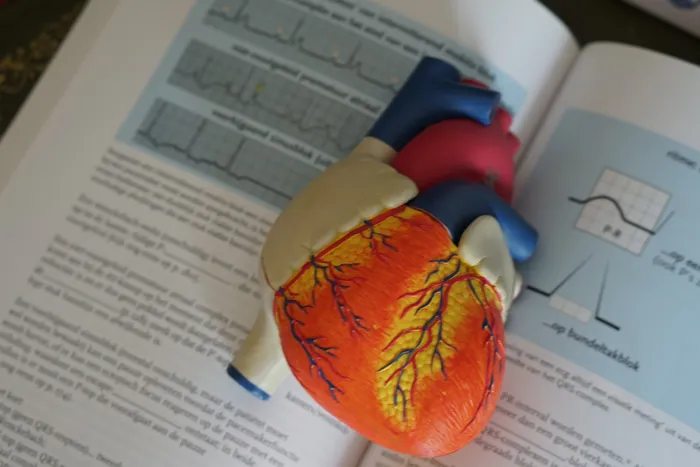Vitamin D and K2 – a game changer for bone and heart health, research indicates

Vitamin K plays a significant role in blood clotting and bone health. Picture by Robina Weermeijer /Unsplash
A study has shown that low vitamin D and K2 levels may be associated with increased mortality and cardiovascular disease risk, a condition that accounts for almost 17 per cent of deaths in South Africa.
The study, published in the European Journal of Nutrition, followed 4 742 participants for 14 years and found that low vitamin D and K2 levels were present in 20 per cent of participants and were associated with a greater risk of all-cause mortality and cardiovascular events.
According to the World Health Organisation, cardiovascular diseases (CVD) are the leading cause of death globally, taking an estimated 17.9 million lives each year.
CVDs are a group of disorders of the heart and blood vessels and include coronary heart disease, cerebrovascular disease, rheumatic heart disease and other conditions.
More than four out of five CVD deaths are due to heart attacks and strokes, and one-third of these deaths occur prematurely in people under 70 years of age.
Although a lot is known about the importance of vitamin D for health, vitamin K has received less attention. Foods containing vitamin K may help protect against cardiovascular disease, a new study suggests the findings come from dietary data from more than 53,000 Danish adults.
The study notes that people with the highest vitamin K1 intakes were 21% less likely to be hospitalised with cardiovascular disease caused by clogged arteries compared with people who had the lowest intakes.
At least one billion people globally are vitamin D deficient and research shows that the risk of all-cause mortality increases by 25% if deficient in vitamin D.
Vitamin D supports immune function, and heart health and increases calcium absorption while vitamin K, of which there are various forms with K2 being the most bioactive, plays a role in blood clotting, strengthening bones and improving heart health.
It ensures that calcium obtained from food is deposited in the bones and not the arteries.

More body of research indicates that vitamin K, particularly its subtypes known as vitamin K1 (phylloquinone) and vitamin K2 (menaquinones), may aid in preventing arterial calcification (stiffening of arteries) and promote cardiovascular health.
Several observational studies have shown an association between higher dietary intake or blood levels of vitamin K2 and reduced risk of CVD events, including myocardial infarction (heart attack), arterial stiffness, and all-cause mortality.
However, further research is needed to establish a clear cause-and-effect relationship and to determine the optimal intake levels of vitamin K for cardiovascular health.
Vitamin K is a fat-soluble vitamin that plays a significant role in blood clotting and bone health. However, emerging evidence suggests that vitamin K may also have implications for cardiovascular health.
Health expert Vanessa Ascencao said research shows at least 80 per cent of deaths caused by heart disease can be prevented by healthier lifestyle choices.
She added: “Follow a healthy diet with increased intake of fruits, leafy green vegetables, healthy fats and fatty fish, and avoid smoking and drinking alcohol.”
Incorporating foods rich in vitamin K into your diet is an excellent way to ensure an adequate intake of this important nutrient.
Here are some dietary sources of vitamin K:
Leafy Green Vegetables: Dark leafy greens are excellent sources of vitamin K1. These include spinach, kale, Swiss chard, collard greens, and broccoli. Aim to include these vegetables in your salads, stir-fries, or smoothies.
Brassica Vegetables: Vegetables from the brassica family also provide a good amount of vitamin K1. Examples include cabbage, Brussels sprouts, cauliflower, and bok choy. Add them to your stir-fries, soups, or roasted vegetable dishes.
Herbs and Spices: Certain herbs and spices are rich in vitamin K1. Parsley, cilantro, basil, and sage are good choices to add flavour and increase your vitamin K intake. These can be used in various dishes, such as salads, sauces, or marinades.
Fermented Foods: Some fermented foods, like natto (a traditional Japanese dish made from fermented soybeans), offer a substantial amount of vitamin K2. Kimchi, sauerkraut, and certain fermented cheeses also contain vitamin K2.
Nuts and Seeds: Incorporating nuts and seeds into your diet can provide you with vitamin K1. Options like pistachios, pine nuts, flaxseeds, and chia seeds can be added to your smoothies, and baked goods, or sprinkled on salads.
“Exercise daily, spend more time outdoors, get your blood levels tested regularly and try high-quality supplements with proven absorption.
“Vitamin K2 regulates normal blood clotting while D3 supports a healthy immune system and muscle function. Research has shown that nutritional absorption through oral sprays is twice as effective as tablets or capsules,” Ascencao added.
Related Topics: